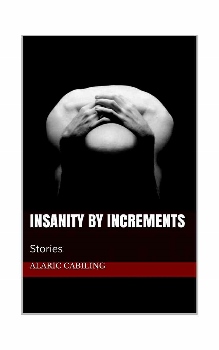Alaric Cabiling, Author
Alaric Al Necro Cabiling is author of Insanity By Increments, stories. He is also known for his published articles at CvltNation.com and EchoesAndDust.com promoting the international extreme music scene.
Review of Pablo Neruda's Residence on Earth by Alaric Cabiling


There are few authors of poetry that span greater relevance through years of publishing unparalleled works of beauty than Chilean poet Pablo Neruda. His Residence on Earth, known in the Spanish as Residencia en la Terra, is an under-appreciated work of behemoth quality that must ultimately bear the burden of being the author’s most unheralded work, simply for the sheer brilliance and incommunicable romance that his love sonnets had fittingly given him due credit for. It is not an impasse therefore that Residence on Earth be revisited for its grandeur, its monumental failure in its lack of commercial viability and its great success at being his most profound and relevant work of poetic brilliance.
The translation to the English language of Residencia en la Terra is done by Donald D. Walsh. And the translation, in all if not most volumes included in said translation, is immaculately rendered. Of course, many poetry lovers the world over have more than a mere fondness for Pablo Neruda’s work. Perhaps iconic throughout contemporary poetry and literature, a former winner of the Nobel Prize, Pablo Neruda has been cited as one of the most consistently admirable writers of the poetry form until his death in 1973. His body of work is some of the most potent, powerful means of artistic expression the world has ever seen.
He writes about his travels to Spain here, and bridges lands together with his native country Chile, once colonized by the former country, he speaks of beauty in both lands unconquered by foreign influence.
“Oh my kinsman, oh guitar player dressed in bees, there can’t be so much shadow in your hair: you come flying.”
Exiled to Mexico as a member of the communist party, his written work surpasses any legacy he is remembered for in politics.
The land he characterizes with such gifted language is a metaphor of itself. Neruda’s love for his country makes manifest in Residencia en la Terra’s mountain ranges, its inexorable landscape, the unforgettable smiles that greet the visitor in the quaint little villages populated by colorful locals. The world is his stage, and all who visit Pablo Neruda’s work finds a union with the land he loves so explicitly.
A nationalist at heart, Neruda attempts the ever-intimidating assignation of writing a vast collection of works thematic in his almost indescribable passion for his native people. Pablo’s inspiration is the untimely dedication he has to living life with an utmost appreciation for beauty paradoxical for its simplicity and virtue.
Yet, one cannot discount the great obscurity that cloaks many of the poems contained in Residencia en la Terra, in comparison to his more famous works. True, the language and style and immediacy his more famous works are known for bring them an unparalleled accessibility towards fans of poetry that love Neruda’s simpler means of expression, but Residence on Earth, finds Pablo Neruda at the height of his writing prowess – the profound symbolism and language distilled in a simple but complex euphemism that describes his heritage.
“Inside my guitar interior there is an old air, dry and resonant, left behind, motionless, like a faithful nutrition, like smoke; an element at rest, a living oil: an essential bird watches over my head: a constant angel lives in my sword.”
Perhaps not as anthemic but is nonetheless deliberately methodical in its characterization of nationalist sovereignty, Residence on Earth lives on in great appreciation by academes and scholars the world over, who can appreciate the dexterity Neruda always maintained with his compositions. The great wind that moves the wind vail, is the same force that drives a man to fulfill his fate, if only for his free will, and defiance towards capture or bondage. Neruda expresses himself with lyrical structure and rhythm, always playful, sometimes pragmatic, but always indefatigable in the crystallization of rich, detailed language.
Chile is not without its great contributions to world poetry and literature, and foremost among them, must be the great Pablo Neruda. Residence on Earth may not be his most sentimental work, but is easily, some of his most relevant. From a trained eye fitting for that of a surgeon, precise in the mapping of a body and its parts, Pablo Neruda skillfully dissects a landscape filled with beauty that is smeared by a love for his craft, a love for poetry, for honesty greater than any man has attempted to rekindle in the expression of such passion for his native land.
 1
1
Diane Donovan of Midwest Book Review reviews Redefining Darkness, Stories
Redefining Darkness is a short story collection pairing protagonist choices and experiences with solid plots representing vignettes of time and place, and demonstrates just how much can be accomplished within the short story format.
Ten circumstances of 'redefining' one's world are illustrated in stories that run the gamut in presenting characters of different ages, sexes, and approaches to life.
Take the opener, 'Day of Darkness', for one example. Seven-year-old Francis is confessing his little crimes, but a bigger one takes place instead. Instantly the scene changes to a police report on television, then to the reactions of the Church, both internally and externally.
Readers receive only four pages to this short story, which create the precise and concise staccato impact of a verbal photo shoot, the camera clicking along from scene to scene while viewers receive a dose of just one definition of a growing darkness.
'Cause of Death', the next story, takes longer to build and describe its particular brand of darkness: here the anniversary of a wife's murder thirteen years earlier brings with it the nightmare of a life lived in grief, among bodies and murders, fueled with the fiery results of vodka and horror.
Again, experience the staccato paragraphs of description that click from scene to scene with the clarity of a camera shutter capturing images and vignettes. Readers have no idea where the journey is heading: all they know is that it's going straight into the darkness of death - with a peculiar twist.
Suicide. Abandonment. Death. The pursuit of fortune and sex. Each short story expertly hones the knife of angst and moves between vastly different character perspectives; and each adds a piece to the evolving jigsaw puzzle theme.
The result is a powerful, gripping gathering that grabs readers and doesn't let go. How does darkness evolve and grow? Read these stories and find out.
That which doesn't kill you, makes you stronger.
My review of Emma Straub's Other People We Married

Emma Straub is a fine author, and Other People We Married is rich with her subtle but persuasive talent. There's humor in every turn. Every detail is almost alarmingly perceptible through her keen observation of everyday life. She's articulate without sounding like a textbook, or a medical dictionary.
The language is hardly spare, drifting between everyday ease and profound articulacy. Her characters are richly depicted and her scenes are so vivid, only a picture would prove to be better. Somehow reading her prose gives a more thorough, complete existence than immersing yourself in actual experience.
It's not always funny though, as proven in her story, Abraham's Enchanted Forest, briefly touching on subtle heartache and tragedy without blowing it up into a tear-jerker replete with crumpled tissue paper everywhere. Sometimes, it's so subtle, it takes careful consideration to notice, and those are the plots that I love the most because they're the most effective.
After all, not everything in life is melodramatic. Straub entertains as much as she writes striking, moving prose - vivid and full of life. Her characters are realistic and they're hard not to like. I can't name one story in her collection I dislike in all truth. Her magic, like I said, is subtle but persuasive.
Just like in her story Pearls, echoing a near flawless rendition of what lies beyond greater awareness of circumstances that are less than ideal. They serve to enlighten us. This reeks every bit like the rotten egg water of last story, Hot Springs Eternal.
Emma Straub is a writer that delights in real situations, situations that any one of us can relate to. Her collection of stories is not fantastical fiction, nor is it plainly rhetorical. She unmasks the transcendental in mundane everyday situations, characters that seem so real, we feel their immutable joys and sorrows long after we've read the book. That is a book to immerse oneself in. That is the sort of book you won't want to miss.
Review of Junot Diaz' This Is How You Lose Her

Junot Diaz was a new name to me when I discovered his enticing collection of short stories, This Is How You Lose Her. I immediately thought that the stories would have been heartbreaking based on the title, but don't think for a minute that failed relationships is all there is to this book.
This Is How You Lose Her was vastly entertaining, and I was really intrigued with Junot Diaz' colorful, poetic but confident prose. The first story, The Sun, The Moon, The Stars, immediately drew me in, and Diaz doesn't disappoint in this collection. One by one, the stories enthralled, sending me rolling on the floor laughing while feeling deeply empathic for the characters at the same time.
The best story on here is 'The Cheater's Guide to Love," if you had to pick a favorite. Diaz doesn't imbue an egocentric literary elitism on this collection. He tells it in a way that modern folks can relate to, without sounding rambling colloquial at the same time.
he paints vivid portraits, and his efforts at brisk but colorful characterization are effective. You get to know these characters in the short time you spend reading about them, and are unsurprisingly drawn into a world outside of your own for the duration of this book. The story, "Ms. Lora," was such an eye-opener. It was juicy without sounding gimmicky-erotic. Latino popular culture has never seen a better narrator. Honestly. Literature should be both fun and entertaining and never more have I been so overwhelmingly won over with such a potent combination.
So, take a trip to Yunior's world back and forth from Santo Domingo to New York City to Boston, Massachusetts. I am now a huge admirer of Diaz' work and being a short story lover, I can't wait til he puts together another entertaining collection. Superb!
Another Five Star Review of Insanity By Increments from Indie Book Reviewers!

I love reading short stories and these ones by Alaric Cabiling were some of the best I’ve read in a long time! I love the author’s easy and graceful use of powerful words to paint each situation and give deep imagery beyond compare. His writing is very descriptive and pulls you in. Some of the stories were sad, some dark and snarky or funny, and some just… were. Loaded with skillful literary prose. The editing was flawless. The stories were all very interesting, and different from one another, and I liked how they deliver a strong emotional punch and ask the deeper questions – forcing us to look at life through a different filter for a while. It’s a fast read and has some darker themes, but a quality collection that will appeal to fans of lit fiction. (5 stars) - Jenna, Indie Book Reviewers
Another Glowing Review of Insanity By Increments by Carla of Indie Book Reviewers

I generally reserve my more effusive praise for long, epic novels that I feel have completely consumed me and hijacked my brain and soul for a time, not usually shorter books that I read in an evening. But today I will be making an exception with “Insanity by Increments” by Alaric Cabiling, a short story collection that tells of different lives of people in state of change, and some with dark circumstances reflective of human nature. Yet even the darker stories are somehow beautiful, poetic and touching. I was surprised by the amount of emotion and investment the author manages to pull from the reader in just a few pages. Sign of a gifted writer there. Would love to read more. (5 stars)
A Superb Review of Insanity By Increments by BellaReadz of Indie Book Reviewers


For me, author voice is almost everything, and it will make or break a book/story and my enjoyment of it. I need to hear originality and know that the author is not trying to sound or write like someone else, but is telling his story in a whole new way, whatever that story may be. I feel like I can smell a fake a mile away, and believe me I’ve read my fair share of books from authors who are ‘trying’ to emulate better, more accomplished authors. What impressed me the most here was that I thought that Alaric Cabiling’s writing style was authentic, genuine, and very well written, and imparted such moving, haunting tales in such a short amount of time….
Local news features latest press release
Local Richmond, VA news station NBC12 features my latest press release announcing availability of Insanity By Increments paperback version:
Insanity By Increments is now available in paperback
Insanity By Increments is now available in paperback at amazon.com. Please visit the product page via the link below:
Insanity By Increments, the ebook, has seen some formatting changes to enhance the reading experience. Available at major retailers worldwide.
Blogcritics.org/Readerviews.com editor Susan Violante's Review of Insanity By Increments
Insanity by Increments: Stories is a collection of short stories by Alaric Cabiling that call to the darker rudiments of human existence. InsanityByIncrementsThe stories range from morose to vicious, to just plain sadness and desolation, as the characters deal with the inequities and trials of life.
The author takes his readers on an unnerving ride through nine different stories, with a haunting look into the duality of goodness and evil presiding within every human being. One man makes the ultimate sacrifice for his brother after their parents die within a few months of each other. A father mundanely trudges through the motions of life after the death of his only child. A boy is abandoned, first by his alcoholic father, then by his mother, as her plans for a new life don’t include him. Beauty queens long buried deep into the earth will pose for a final photo shoot at the whim of a madman. Cruelty is dosed out by one man in strangled silence over the years, after a tragic accident renders a “normal” life to be just out of reach.
The stories in the collection are written in the Gothic horror tradition, yet portray a somewhat modernized style, creating an appeal to an expanded audience, and not just reserved for those typically drawn to classic literary works. Morbidity, depression, anguish, and horror create the underlying tone for most of the stories. It’s often these unspoken subtleties set the scene even more so than the author’s vivid depictions of a stormy night, an abandoned house, or a patch of dead trees surrounding a misty swamp.
As is the perfect nature of the short story, I was left wanting more, and in deep deliberation of all the possible scenarios, “what-if’s” and “if-only’s” at the end of each tale. Indeed, a complete novel could be written on each short story. My mind continually drifted back to the classic quote from Henry David Thoreau, “Most men lead lives of quiet desperation and go to the grave with the song still in them.” I felt that quiet desperation to be more intense and threatening than traditional horror, where you expect to be terrified.
I found Insanity by Increments: Stories by Alaric Cabiling to be quite engrossing. He does a brilliant job of getting into your head and delivering powerful story lines. This is a book that will linger in your mind long after you finish the last page.
Another great review of Insanity By Increments!

Excerpt from The Illusion of Progress, Insanity By Increments
One October night, Marcela came home late, close to midnight. Saul was asleep in his room. I’d spent the greater part of the day with him, looking after him in the afternoon, cooking supper and feeding him, reading to him before bed. The street lamp sent a hazy light through the curtains, and I watched Marcela undress, ready to slip into her side of the bed, beside me. I waited patiently for her in the darkness.
“Where have you been?”
“Grant, I’m sorry. I thought you were asleep.”
She slid into the sheets quietly, facing the window outside, never once looking at me.
“I had something I needed to take care of,” she said.
“What was it this time?”
“Just work. Go to sleep, honey.”
She might have expected me to stop there, but I pressed further. She was lost to me then. She had been for a while, seeing the man she'd met on one of her trips to Paris. I had even seen them in my dreams, their naked bodies, their smooth skin, making the kind of love that I had never known from her. She whispered sweet nothings to him and she had meant them, the way she never had with me, and never would.
“I know you’ve been unfaithful,” I told her, looking up at the ceiling, never once at her. She continued to face the window. She has resigned herself to this marriage, I thought to myself, eyes hot with anger and hurt. All she ever had to do was tell me she wanted out.
“Yes, I have been,” she said.

Helen M., Bookseller Reviews Insanity By Increments c/o Netgalley
An interesting take on the Gothic form, with some eerie tales, some tales of life on the downside of things and some tales of tragedy, which leave you feeling either down or disturbed, but none of which fail to stir emotions in the reader.
Reviewed by Helen Marquis, Netgalley
Splendid. A Publisher Out There Must Re-Print This

There's few books of poetry that stir me. Sometimes, you find a few poems you like from a collection, sometimes you find many, but Justin Hyde's Down Where the Hummingbird Goes To Die is splendid top-to-bottom. Laced with very dark humor, the poetry in it masks nothing. Contemporary images both satirical for stereotypes and openly fringe-worthy make a rousing impression on the reader. You won't forget poems in it like "I Stole My Wife's Smile." Dark poetry sees many inept practitioners, but every so often, someone gets it right. This is true for Hyde's out-of-print title, which someone in the publishing industry must do justice to, and re-press.
 1
1
Review of Insanity By Increments by Henry Baum of SPR
Insanity by Increments by Alaric Cabling is a work of Gothic literary short fiction about people on the edge – isolated from other people, and from themselves.. No one acts predictably, nor does the world around them. It’s not just the characters who have dark impulses, the world they inhabit is just as sinister.
The collection is moody, cerebral, and ultimately very affecting. In each of the stories, men grapple with isolation and abandonment. Some of their lives are mundane and ordinary, while some are truly outcasts, but they all share a similar sense of alienation. The collection could have devolved into narcissism or self-pity, but it never does. What separates Insanity by Increments from other “angry young man” fiction is that it takes a turn into the surreal. The stories are at once a realistic look at the human condition, and how that human condition is put to the test in increasingly distressing, and frankly strange, scenarios.
The title is very apt: this collection is a slow burn. It’s not horror in the traditional sense, with jump scares and obvious terror, but it’s harrowing all the same. The stories are recommended for fans of Poe, Hawthorne, Lovecraft and Maupassant, but with a more modern sensibility. To this reviewer, that’s a very potent combination for a work of literary short fiction.
 1
1
Interview With Alaric Cabiling By Diane Donovan
Please check out this interview of author Alaric Cabiling by Diane Donovan, book reviewer.




